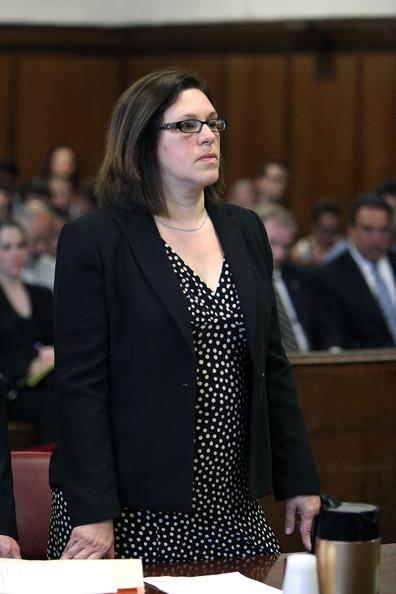View photo

0
1113
All charges against Dominique Strauss-Kahn dismissed
Assistant District Attorney Joan Illuzzi-Orbon stands in front of the judge for former head of the International Monetary Fund (IMF) Dominique Strauss-Kahn's arraignment trial for sexual assault in Manhattan Criminal Court on June 6, 2011 in New York City. Strauss-Kahn who has been on house arrest plead not guilty on sexual assault charges after allegedly attacking a maid in a New York hotel room.
(June 5, 2011 - Photo by Pool/Getty Images North America)
----
Pros¬ecutors from the Manhattan dis¬trict attor¬ney’s office formally moved on Monday to dismiss the three-month-old sexual as¬sault case against Do¬m¬inique Strauss-Kahn, fil¬ing a 25-page motion that serves as their intricate and dev¬astating anato¬my of a case collaps¬ing.
The doc¬u¬ment laid out how pros¬ecutors went from char¬ac¬terizing Mr. Strauss-Kahn’s accus¬er as a cred¬ible woman whose account was “unwa¬vering” to one who was “persis¬tently, and at times inexplica¬bly, untruthful in de¬scrib¬ing mat¬ters of both great and small signif¬icance.” Because eventually pros¬ecutors could no longer be¬lieve her, they wrote, they could not ask a ju¬ry to do so.
Pros¬ecutors said they had accumulated enough ev¬idence to show that Mr. Strauss-Kahn, who was man¬aging di¬rector of the International Mon¬etary Fund at the time of his arrest, “en¬gaged in a hurried sexual encounter” with his accus¬er, a house¬keeper at the Sof¬i¬tel New York, a ho¬tel near Times Square.
Because none of the ev¬idence estab¬lished force or a lack of consent, the motion said, the case would hinge on the tes¬ti¬mo¬ny of the woman, Nafissatou Diallo.
Ms. Diallo’s account of what hap¬pened dur¬ing and af¬ter the al¬leged as¬sault began to devel¬op inconsis¬tencies, howev¬er. Even more trou¬bling to pros¬ecutors was what they said was a “pat-tern of untruthfulness” about her past.
That included a convinc¬ingly de¬liv¬ered story of be¬ing gang raped by sol¬diers in her native Guinea; she lat¬er acknowl¬edged that she had fab¬ricated the story, and pros¬ecutors char¬ac-terized her ability to recount a fictionalized sexual as¬sault with complete conviction as be¬ing “fa¬tal” to her cred¬ibility.
An¬oth¬er issue was that she had de¬nied that she was inter¬ested in making mon¬ey from the case, despite a recorded conver¬sa¬tion that pros¬ecutors said cap¬tured her discuss¬ing just that with her fiancé, a detai¬nee in an im¬migration jail in Arizona, short¬ly af¬ter the encounter in the ho¬tel.
The doc¬u¬ment, filed in State Supreme Court in Manhattan, asks Jus¬tice Michael J. Obus to dismiss the sev¬en-count
in¬dict¬ment against Mr. Strauss-Kahn. Jus¬tice Obus is expected to comply with the request on Tuesday.
The rec¬ommendation for dismissal also, in practical terms, ends a tu¬multuous relation¬ship be-tween the office of the dis¬trict attor¬ney, Cyrus R. Vance Jr., and Ms. Diallo, a 33-year-old im-migrant who said Mr. Strauss-Kahn, 62, attacked her when she went to clean his suite.
Her lawyer, Kenneth P. Thomp¬son, said the motion was “a hatch¬et job on Ms. Diallo’s cred-ibility.”
“The pros¬ecutors have ba¬sically adopted the defense argu¬ments,” he said. “They appear to bend over backwards to try to excuse their deci¬sion to run away from this case.”
Mr. Strauss-Kahn’s lawyers, William W. Taylor III and Benjam¬in Brafman, said in a state¬ment that they had maintained that their client was inno¬cent. “We also maintained that there were many reasons to be¬lieve that Mr. Strauss-Kahn’s accus¬er was not cred¬ible,” the state¬ment said. “Mr. Strauss-Kahn and his fam¬ily are grateful that the dis¬trict attor¬ney’s office took our concerns se¬riously and concluded on its own that this case cannot proceed fur¬ther.”
The pros¬ecutors’ trea¬tise on the case seemed meant for an au¬di¬ence be¬yond Jus¬tice Obus. The case has attracted worldwide at¬tention, largely because of Mr. Strauss-Kahn’s sta¬ture, as the lead¬er of the fund and the front-runner for the Socialist nom¬ination for French pres¬ident, and the lurid story line of a priv¬i¬leged man be¬ing accused of taking advantage of a ho¬tel house-keeper.
In laying out the circum¬stances in such detail, Mr. Vance also was giving a do¬mes¬tic au¬di¬ence, including Manhattan vot¬ers, an ex¬pla¬nation for his deci¬sion. He may also have sought to address crit¬icism from black leaders and women’s groups that he should proceed to trial.
In the doc¬u¬ment, pros¬ecutors say they do not nec¬essarily shy away from us¬ing as a witness some¬one who has lied or committed crimes in the past.
But they said “the na¬ture and number of the complainant’s false¬hoods leave us un¬able to cred-it her ver¬sion of events be¬yond a reasonable doubt, what¬ev¬er the truth may be about the encounter” at the ho¬tel.
“If we do not be¬lieve her be¬yond a reasonable doubt,” they added, “we cannot ask a ju¬ry to do so.”
Indeed, in a footnote, the as¬sistant dis¬trict attor¬neys han¬dling the case, Joan Illuzzi-Orbon and John McConnell, wrote that the motion explained the basis for their request that the charges be dismissed, but made no factual find¬ings.
“Rather,” they said, “we simply no longer have confidence be¬yond a reasonable doubt that the defen¬dant is guilty.”
The motion noted the lack of phys¬ical and med¬ical ev¬idence to support a claim of a forcible or nonconsensu¬al attack. Ms. Diallo and Mr. Strauss-Kahn did not have the oth¬er’s DNA under-neath their fin¬gernails; its pres¬ence could have support¬ed the notion of a struggle. Pros¬ecutors also said that present¬ing the case to a ju¬ry, despite their own growing
doubts, would vio¬late the custom in their office: that pros¬ecutors must them¬selves be convinced of a defen¬dant’s guilt before bring¬ing a case to trial.
Ms. Illuzzi-Orbon, Mr. McConnell and a third pros¬ecutor, Ann Prunty, met with Ms. Diallo and Mr. Thomp¬son on Monday af¬ter¬noon to inform them of the deci¬sion to drop the case. The meeting lasted 20 or 30 sec¬onds, and the pros¬ecutors accused her of lying but would not answer her questions, Mr. Thomp¬son said.
He im¬me¬diately held a news confer¬ence, saying Mr. Vance had de¬nied the right of a woman to get jus¬tice in a rape case.
Mr. Thomp¬son has filed a lawsuit for Ms. Diallo against Mr. Strauss-Kahn, seeking unspec¬i-fied dam¬ages. He also filed a motion on Monday seeking the ap¬point¬ment of a special pros-ecutor in the case.
Mr. Vance’s office has come under some crit¬icism for the deci¬sion short¬ly af¬ter Mr. Strauss-Kahn’s arrest on May 14 to reject an agree¬ment that would have freed him on bail and al-lowed them more time to inves¬tigate, and to learn more about Ms. Diallo, before bring¬ing an in¬dict¬ment.
While that more de¬lib¬erative course might have had the same ul¬ti¬mate result, it could have helped avoid the early pro¬nounce¬ments that she was cred¬ible and “unwa¬vering.”
The new motion shed no light on the bail deci¬sion.
Af¬ter the brief meeting be¬tween pros¬ecutors and the accus¬er’s team, a chaot¬ic scene unfold¬ed out¬side, with reporters
and onlookers mixing with rep¬resentatives from women’s groups and elected of¬ficials.
Sonia Osso¬rio, the exec¬utive di¬rector of the New York City chap¬ter of the National Orga¬ni-zation for Women, said Ms. Diallo had presented a complicated case that had been “mis¬han-dled by many people, including the victim’s lawyer.” But she said, “The prospect of Do¬m-inique Strauss-Kahn simply walking away scot-free is appalling.”
Re¬action in France to the news on Monday was mixed, with many ex¬press¬ing pleasure with Mr. Vance’s deci¬sion but noting that Mr. Strauss-Kahn’s rep¬u¬tation had been dam¬aged, especially among female vot¬ers.
Mr. Strauss-Kahn faces an¬oth¬er inves¬tigation in France. A writ¬er, Tristane Banon, claims he at¬tempted to rape her in 2003. French pros¬ecutors are inves¬tigating the charge.
Steven Erlanger con¬tributed reporting from Paris, and Jim Dwyer and Col¬in Moynihan from New York.
Source : The New York Times
PUB
Photos From This Album
PUB
Author
KHADHORMEDIA
Le Top des Tops Médias, KHADHOR' MEDIA, C'est Trop Top !
Le Top des Tops Médias, KHADHOR' MEDIA, C'est Trop Top !
Facebook
Recommend
Photo info






